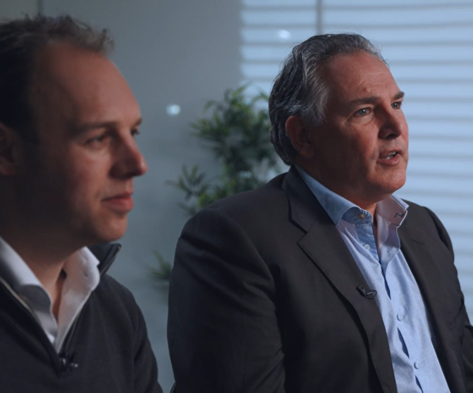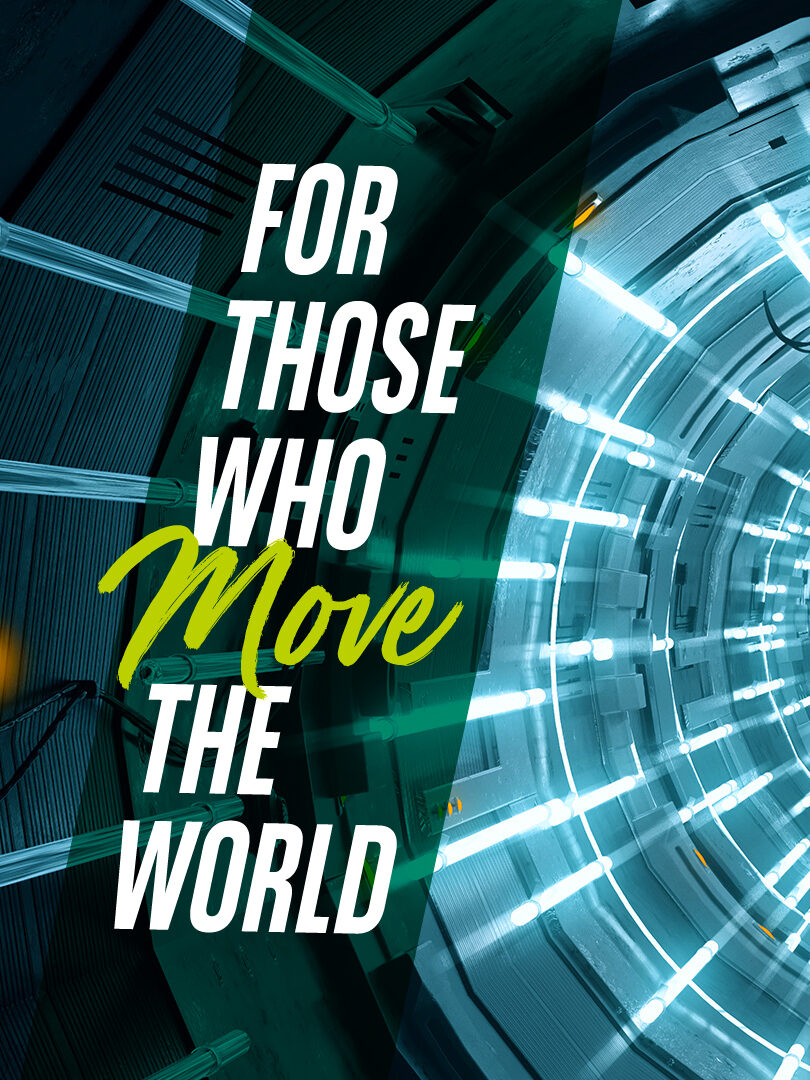‘Closing the circle together with customers’
A conversation with Robert Videler and Chris Poole, Flexible Packaging Solutions (FPS)
Flexible Packaging Solutions (FPS) makes and sells ‘big bags’ and other flexible packaging solutions. As the market leader, they consciously aim to blaze the trail in sustainability and circularity. CFO Robert Videler explains how this company makes the difference with its own production locations and by closing the circle.
Several empty big bags can be seen lying around at FPS headquarters in Amstelveen. They’re used as packaging for the storage and transportation of industrial bulk goods. In the business, they’re technically known as flexible intermediate bulk containers (FIBCs). CFO Robert Videler explains that FPS commands a special, leading position in this market. ‘We sell these big bags to customers around the world.’ Those are mainly medium to high-end customers. ‘We customise all our FIBCs for business-to-business customers, for instance.’ Videler tells us that the global FIBC market is estimated to be worth four billion euros. ‘With about eight to nine per cent of that, we’re the market leader.’
What makes FPS different from most players in this business is their global spread and that they produce the majority of their sales products themselves. ‘We have international sales locations and – as the only one in our industry – 13 production locations spread across several continents. The advantage is that we have complete control over quality and that we can share product-specific knowledge with our customers. In addition, we are also able to guarantee delivery even in the event of problems with production, like during COVID. Or if there are supply problems, like we see in the shipping routes such as the Suez Canal and the Red Sea.’
At the vanguard of sustainability
FPS has chosen to lead the way in sustainability because that fits in with the value-driven direction in which the company is moving, Videler tells us. ‘FPS works according to the three basic principles of our shareholder, ADG: giving, earning and sustainability. Together, these stand for meaningful working and living. ‘Giving’ doesn’t come first for nothing. We want to contribute to the welfare of people worldwide. We want to make a positive impact: not through philanthropy but by actively contributing via our colleagues and products.’
Regarding their sustainably principle, FPS is going all out to make their products better for the environment. As one of the first, they are able to offer their customers a solution that is truly sustainable. They decided to make the existing product more sustainable because there is still no good alternative to the incredibly strong and light plastic big bag, says Videler. On the one hand, they repair and clean FIBCs so they can be reused. On the other, they recycle FIBCs that have reached the end of their useful life and then use the recycled material to make new FIBCs. Videler: ‘That means closing the circle together with customers, as we help to create a circular economy.’

“Countries will be placing an extra tax on single-use plastics that do not contain at least 30% recycled plastics. In that case, you need to be able to show that at least 30% of the packaging is made of recycled materials. And yes, we can do that with our products.”
Robert VIdeler, CFO FPS
Competitive advantage
FPS is the first to offer customers this sustainable solution, says Videler. ‘Recycling used big bags is complicated. There’s no proven, well-working process in the market. So we spent several years developing one ourselves. It’s unique – nobody else has it. Being able to offer that to customers gives us a big competitive advantage.’
Videler expects that the European directive on the reduction of the use of single-use plastics to promote a circular economy will work in FPS’s favour. ‘Countries – the UK and Spain are already doing it – will be placing an extra tax on single-use plastics that do not contain at least 30% recycled plastics. In that case, you need to be able to show that at least 30% of the packaging is made of recycled materials. And yes, we can do that with our products. That makes them very attractive to our customers.’
Circularity
FPS’s leadership position can pay off in the years to come. Sustainability matters to customers. ‘It’s one of the main things that customers ask about’, knows UK head of sustainability and general manager Chris Poole of FPS. He’s also convinced of the power of the company’s circular approach. ‘Circularity – making materials last longer by using them again and again – is extremely important because we want to avoid waste and want to work on a better environment for today and tomorrow. It’s actually vital because we don’t want to deplete our natural resources.’ Poole says it’s the goal of FPS to become as circular as possible.
FPS has been attracting much attention in this area. Poole explains why: ‘We design our FIBCs now so that they contain as little material as possible and, where possible, can be repaired and recycled.’ They’ve arranged things in such a way that used big bags do not end up at waste processing companies or downcyclers. Those used big bags now go to FPS’s own recycling service. ‘Since 2022, we have a recycling hub in Romania where materials from used FIBCs are extracted and reused to produce new ones. Our recycling hub also has a recovery business unit that repairs certain big bags so they can be used again. That can be done a maximum of six to eight times.’ All together, FPS has developed a fully sustainable service. ‘In our line of business that’s one of a kind’, Poole proudly concludes.
Financing winners
‘For us, FPS is quite an attractive customer because we want to finance the winners of their respective sectors’, says Tom Scholten of BNP Paribas. He’s the bank’s senior relationship manager for FPS.
‘We partner with them in the area of working capital. In addition to providing loans, we also help them on a broader basis, such as with making their organisation more sustainable. That broader level of service helps us really understand our customers and provide them with the best possible support.’ FPS is a perfect match for BNP Paribas because of their similar long-term perspective and international field of operation, finds Scholten. ‘We both aim to be successful in what we do and to do more for the world. FPS’s passion to actually achieve these goals – especially regarding circularity – really appeals to us. I think that’s what makes them the current leader, and it’s why I believe they’ll hold on to that position for a long time.’
Multi-stakeholder approach
Sustainability adviser Rado Georgiev at BNP Paribas thinks it’s great to see how FPS has approached circularity: ‘They put their heads together with their stakeholders to rethink how they use materials and how they can minimise waste. That’s what we like to see and where we are happy to provide companies with support. The transition to circularity calls for a multi-stakeholder approach: companies, customers, banks and legislators all need to work together. We as a bank play mainly a facilitating role in that regard. ‘We support circular companies like FPS so they can achieve their sustainability and circularity goals more quickly. We are also keen to put such leading companies forward as best practices so that others can learn from their experiences. Together, we can take the necessary steps towards a circular economy.’

Read the other stories of frontrunners in the Netherlands.
Check out how we collaborate with partners and clients in our international network.